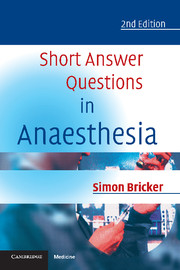Book contents
- Frontmatter
- Contents
- Preface
- Preface to the 1st edition
- Abbreviations
- 1 Advice on answering short answer questions
- 2 General Anaesthesia
- 3 Anaesthesia and Medical Disease
- 4 Medicine and Intensive Care
- 5 Obstetric Anaesthesia and Analgesia
- 6 Paediatric Anaesthesia
- 7 Neuroanaesthesia
- 8 Acute and Chronic Pain
- 9 Trauma and Emergency Anaesthesia
- 10 Anatomy, Applied Anatomy and Regional Anaesthesia
- 11 Pharmacology and Applied Pharmacology
- 12 Clinical Measurement and Equipment
- 13 Cardiac and Thoracic Anaesthesia
- Index
4 - Medicine and Intensive Care
Published online by Cambridge University Press: 05 February 2014
- Frontmatter
- Contents
- Preface
- Preface to the 1st edition
- Abbreviations
- 1 Advice on answering short answer questions
- 2 General Anaesthesia
- 3 Anaesthesia and Medical Disease
- 4 Medicine and Intensive Care
- 5 Obstetric Anaesthesia and Analgesia
- 6 Paediatric Anaesthesia
- 7 Neuroanaesthesia
- 8 Acute and Chronic Pain
- 9 Trauma and Emergency Anaesthesia
- 10 Anatomy, Applied Anatomy and Regional Anaesthesia
- 11 Pharmacology and Applied Pharmacology
- 12 Clinical Measurement and Equipment
- 13 Cardiac and Thoracic Anaesthesia
- Index
Summary
Describe the diagnosis and management of Guillain–Barré syndrome.
Guillain–Barré Syndrome (Landry–Guillain–Barré syndrome) is one of the most common neurological disorders which requires intensive care. Anaesthetists need to be familiar not only with the ITU management of a complex disorder, but also with the clinical features which make ITU admission and IPPV more likely.
Introduction
Guillain–Barré syndrome is an acute demyelinating polyneuropathy of uncertain aetiology. It is believed to have an immunological basis as it frequently follows viral and other infections. Its presentation is variable, although motor weakness is more pronounced than sensory loss.
History
Recent viraemia or bacterial infection, e.g. campylobacter, also immunisations and surgery.
Ascending motor weakness is typical, onset over days (can be rapid).
Sensory symptoms and paraesthesia, also pain in >50% and hyperpathia.
Differential diagnosis: other causes of acute polyneuropathy/polyneuritis: poisons, drugs, organophosphates, heavy metals, alcohol, malignancy, inflammatory processes, transverse myelitis, poliomyelitis, Lyme disease, AIDS, myasthenia gravis.
Examination
Motor impairment, loss of deep tendon reflexes, sensory changes.
Signs of autonomic instability: postural hypotension, sweating, tachycardia, hypertension.
Investigations
Lumbar puncture: increase in CSF proteins, white count unchanged.
Serology: may have antibodies, e.g. to Ebstein–Barr virus, mycoplasma, campylobacter.
Nerve conduction: reduced at various sites.
- Type
- Chapter
- Information
- Short Answer Questions in Anaesthesia , pp. 131 - 154Publisher: Cambridge University PressPrint publication year: 2002



